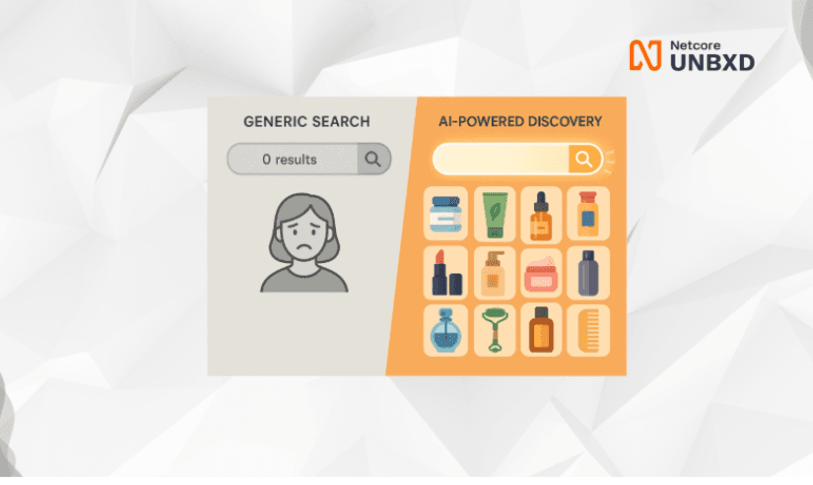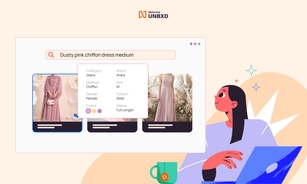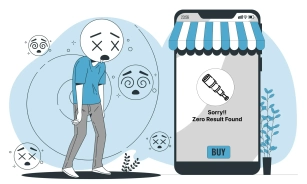- ProductsSearch and BrowseRecommendationsCustomer Engagement
Why generic product discovery fails the health & beauty test

Picture a shopper who types “sulfate-free shampoos for oily skin” into your site search. If the first screen shows a random mix of body lotions and SPF sticks—or worse, a dead-end “0 results” page—that shopper is gone.
Search users account for 83% of online revenue in health & beauty, and 43% of retail shoppers start their session in the search bar, so every bad result - your revenue takes unprecedented hits. Yet 41% of major ecommerce sites can’t handle eight basic query types, such as qualifiers, symptoms, or compatibility keywords, and nearly half leave users stranded on zero-result pages.
Why health & beauty websites struggle with generic search
Health & beauty catalogues combine scientific rigidity with deeply personal preference, and that cocktail causes a plethora of problems for generic product discovery engines.
-
Ingredient sensitivities have gone mainstream. Queries such as “sulfate-free,” “pregnancy-safe,” or “vegan” have shifted from “nice to have” to “non-negotiable.” When a person omits or misspells even a single attribute, keyword-driven engines happily serve the wrong SKU, creating a poor customer experience leading to drop-offs & no sales.
-
The shade and variant tsunami. A single foundation line routinely ships in sixty to a hundred shades, lipsticks multiply by finish and undertone, and each tiny variant needs to surface only for the right complexion or else disappoint. NielsenIQ reports that beauty still outpaced every other discretionary sector in sheer new SKU creation, driven by indie labels and social media micro-launches.
-
Evolving shopper vocabulary. Customers now search for “glass-skin glow,” “rose-citrus scent,” or “matte but hydrating.” These phrases float outside rigid taxonomies, so the hero serum marketed as “brightening drops” may never appear when a shopper types “glow drops.”
Because generic engines rely on literal keyword matching, they stumble when a crucial attribute is missing or misspelled in catalog data. A cruelty-free query can surface animal-tested SKUs simply because the safe products were never tagged, while an allergy-sensitive shopper typing “nut-oil free” may face a barren results page even though suitable items exist.
Variant blindness compounds the damage; engines that do not understand undertones often float the beige best-seller to everyone. This happens because recommendations are wired to past site-wide popularity rather than personal context, a highly comedogenic best-seller can still dominate a routine-builder for a shopper who has declared oily, acne-prone skin in the past.
The compounding cost of getting it wrong
Poor discovery bleeds money on several fronts. Bounce and exit rates leap whenever the first results miss intent; those lost sessions seldom return. High return volumes eat deeper into profit in beauty than in fashion or electronics because hygiene laws force destruction of opened items, and Shopify’s retail analysis warns that processing a single return can absorb twenty to sixty-five percent of the item’s cost in shipping, inspection, and disposal.
Meanwhile, the inability to surface regimen bundles, refills, and complementary shades dampens the average order value that beauty retailers rely on to offset free shipping thresholds and influencer commissions. Worst of all, trust erodes quickly: a customer whose “sulfate-free” promise is broken is unlikely to give the brand a second chance.
Top 4 “must-have” capabilities for health & beauty product discovery & search
Ingredient-aware semantic search & variant handling
Beauty catalogs are packed with subtle shade differences, ingredient claims, and specific product attributes—think “sulfate-free lavender shampoo, 250 ml.” Without a semantic engine that understands ingredient names, skin concerns, and product variants, shoppers struggle to find the right match. The result? Missed conversions, costly returns, and frustrated customers. A smart search engine can eliminate that friction by surfacing the exact product in a single query.
Named-entity recognition (NER) for beauty language
Shoppers use rich, descriptive phrases like “rosy-citrus scent” or “glass-skin glow.” NER interprets those ambiguous, adjective-heavy queries, mapping them to the right attributes so the search results feel magically accurate and brand-safe.
Real-time, in-session personalization & AI recommendations
Even first-time visitors leave valuable intent signals—category clicks, filter choices, shade previews. Live algorithms that learn from these micro-behaviours can reorder results and inject “frequently bought together” or “similar undertone” suggestions, lifting conversion without extra content creation.
No-code merchandising workbench
Marketers should have the power to promote best-sellers, spotlight new launches, or downplay low-margin SKUs in minutes—no engineering support required. With real-time analytics on every rule, they can quickly respond to flash trends and influencer-fueled demand spikes that define the fast-moving beauty space.
Deborah Lipmann: A Netcore Unbxd success story
Netcore Unbxd replaced Deborah Lippmann’s Magento search with a comprehensive product-discovery platform that understood shopper intent, corrected spelling errors, and recognised colour-specific and long-tail queries. The upgrade introduced predictive autocomplete, highly relevant results, and a 1-to-1 recommendation engine that facilitated upselling and cross-selling. Deborah Lipmann could now launch occasion-based landing pages and promotional banners through an intuitive dashboard—no IT tickets required—and the implementation was completed in just two weeks. Since going live, Deborah Lipmann has recorded a 45% increase in orders, a 40% rise in conversion rate, 30% more click-throughs, and a 28.6% uplift in revenue, underscoring how more intelligent search and personalized recommendations can directly accelerate growth for beauty brands.
Conclusion: Speak the language of beauty or pay the price
Generic discovery engines were designed for “red sneakers,” not for “light-coverage SPF-50 BB cream that won’t clog pores in humid weather.” Beauty shoppers expect dermatologist-grade precision, ethical transparency, and influencer-worthy aesthetics, delivered through a tiny text box—or they leave. The cost of disappointing them is measured in bounces, destroyed inventory, and eroded lifetime value. The upside of delighting them is equally dramatic: higher conversion rates, larger baskets, and loyalty that lights up social media. By enriching catalog data, decoding beauty-specific language, weighting attributes in real-time, and providing merchandisers with agile control, AI-powered discovery platforms such as Netcore Unbxd turn every search into a confident purchase and every confident purchase into a repeat customer. If your storefront is still forcing beauty shoppers to hunt in the dark, now is the time to bring the lights up.
Book a demo and see how beauty-native discovery can let your customers find exactly what makes them glow.


